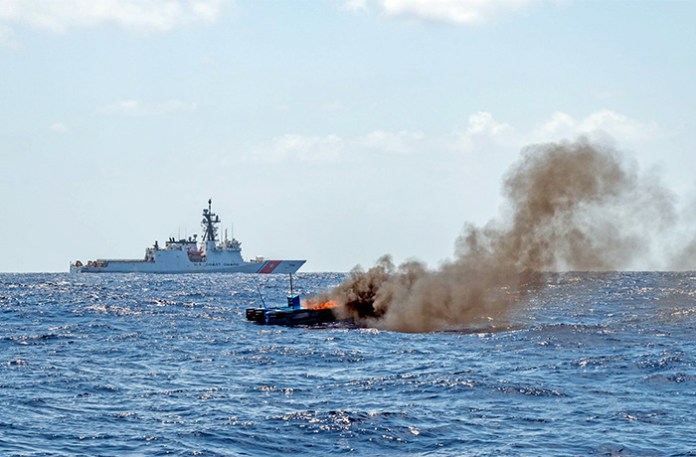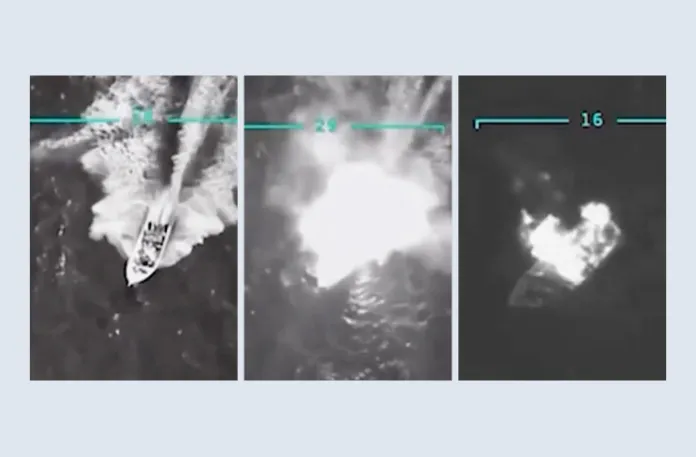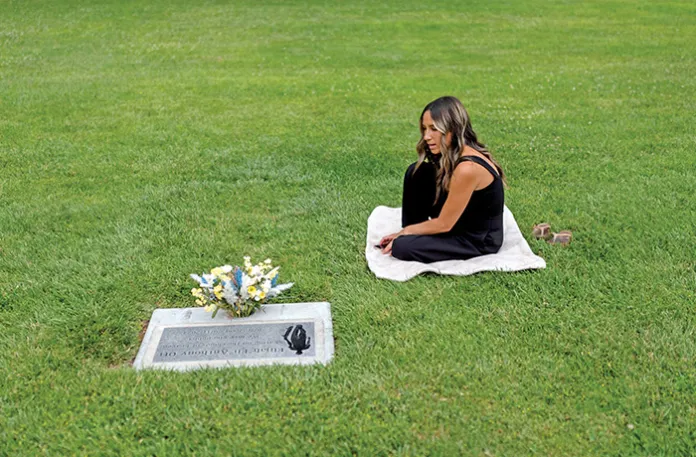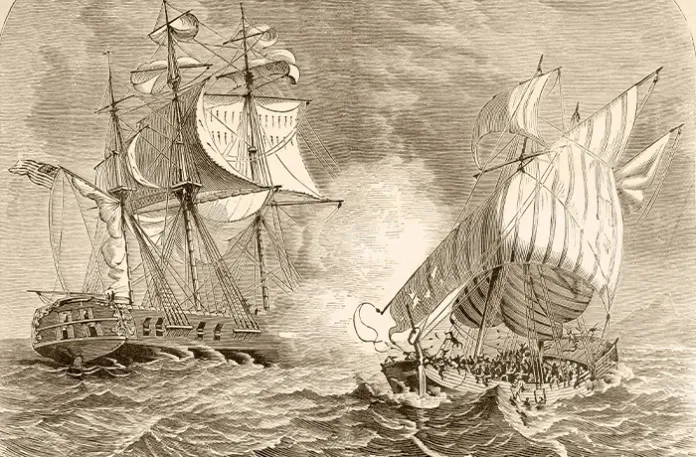The Caribbean sun hung low over the turquoise swells, a deceptive calm masking the venom slithering beneath. In September, a U.S. military strike targeted a Venezuelan speedboat, laden with illegal drugs bound for American shores, in international waters south of the region. The vessel, allegedly tied to the Tren de Aragua gang, erupted in flames, killing all 11 aboard. President Donald Trump shared the details on Truth Social that evening: “Please let this serve as notice to anybody even thinking about bringing drugs into the United States of America BEWARE! Thank you for your attention to this matter!!!!!!!!!!!” Yes, you counted right — that’s 11 exclamation marks! The president really wanted to make sure that possible drug-smugglers were paying attention to this matter.
It was the opening salvo in what Trump has called a campaign to unleash American steel and resolve against the drug cartels strangling the hemisphere. In the weeks that followed, the strikes have multiplied like thunderclaps in a squall. By mid-October, the U.S. military had conducted at least seven known attacks on suspected drug vessels in the Caribbean, destroying boats and killing dozens linked to groups such as Tren de Aragua and the Colombian National Liberation Army. The U.S. Navy’s armada — warships, aircraft, and thousands of sailors and Marines — has been churning the waters, with deployments including F-35 jets staged from Puerto Rico.
These haven’t been some half-measure interdiction operations, the kind that let smugglers slip the net with a slap on the wrist. Trump has declared it an armed conflict — full-throated, no-holds-barred. In a classified memorandum to Congress leaked to the press on Oct. 2, the White House branded the cartels “unlawful combatants” — non-state armed groups waging an armed attack on the U.S. No more treating these poison peddlers like garden-variety crooks. They’re enemy belligerents now, fair game under the laws of war. The strikes, according to the memo, are legally authorized “self-defense” against terrorists such as Tren de Aragua and the Cartel de los Soles, Maduro’s narco-shadow empire.

Critics have howled. Sen. Jack Reed (D-RI) has decried it as “secret wars against secret enemies,” a dangerous stretch of executive power that flirts with illegality. Human rights groups have been wringing their hands over extrajudicial killings, collateral risks to fishermen, and the specter of escalation into Venezuelan soil. Even some Republicans have been murmuring about congressional buy-in. But down in the trenches, where synthetic opioids such as fentanyl claim over 72,000 American lives in 2023 alone, the leading cause of overdose deaths for adults 18-45, folks aren’t parsing the Geneva Conventions. They’re grieving losses. And Trump’s base is cheering the resolve.
Flash back to a rain-slicked rally in Phoenix in August 2024. Trump, sweat beading under the lights, grips the podium like a sledgehammer. “The cartels are running wild. … They’re invading our country, they’re murdering our citizens — beautiful, innocent Americans dying from this poison every single day.” He’d been hammering it since the campaign: Designate the cartels as foreign terrorist organizations. Unleash the military on them. No more kid-glove diplomacy with Nicolas Maduro’s Venezuela or the Chinese precursors fueling the fentanyl flood. When the votes tallied and the Oval Office keys clinked back into his palm on Jan. 20, Trump didn’t waste a breath. By late August, U.S. Southern Command’s forces were briefing a surge: P-8 spy planes slicing the horizon, destroyers prowling for prey, F-35s staging from Puerto Rico. “The military is surging in the Caribbean—strong, smart, and unstoppable,” Trump posted on Truth Social. “No more begging for nods from weak leaders. America projects power, period. Cartels beware!” Apparently, the exclamation mark ante needed to be upped by the following month.
The rationale was crystal clear. The Caribbean isn’t some postcard paradise — it’s a cartel superhighway. Cocaine from Colombia’s labs sluices through Venezuelan ports, then hops islands to U.S. shores. Tren de Aragua runs the routes with AKs and arrogance. And while fentanyl flows mainly via land borders, maritime routes in the region handle a growing share of cocaine trafficking — up to 14% of U.S.-bound loads in recent years, per Drug Enforcement Administration assessments. Trump’s fix has been to flood the zone: joint operations with the Dominican Republic and Trinidad and enhanced surveillance inside Venezuela. On Oct. 17, the Navy detained survivors, suspected Tren de Aragua affiliates, from a strike.

The fentanyl crisis underscores the stakes: Over 72,000 deaths were linked to synthetic opioids such as fentanyl in 2023, per Centers for Disease Control and Prevention data. The drug has fueled a multibillion-dollar enterprise for Mexican and Venezuelan cartels. Treasury estimates peg cartel profits from fentanyl at $1.4 billion in 2024 alone. The toll on grieving American families has been unrelenting. Something, clearly, has needed to change.
Trump’s change was to channel the spirit of America’s founding grit. To grasp the why and the how of these operations, you have to sail back two centuries, to when a fledgling republic stared down sea wolves not unlike today’s narcos. Picture it: We’re back in 1801, on the deck of the USS Enterprise, bobbing off Tripoli’s sun-baked shore. The Stars and Stripes fly defiantly, but the crew, mostly farm boys-turned-sailors, knows the odds. North Africa’s Barbary pirates, corsairs from Algiers to Tunis, have been bleeding American commerce dry since the Revolution snapped the Royal Navy’s apron strings. No more protection from His Majesty’s ships — Yankee traders are fair game.
These weren’t swashbuckling rogues in eye patches. The Barbary states, semi-independent Ottoman fiefdoms ruled by deys and bashaws, ran state-sponsored piracy like a cartel franchise. Xebecs and galleys, sleek as switchblades, pounced on merchantmen in the Mediterranean. Cargo was seized, and crews were chained and sold into slavery or held for ransom. The going rate for tribute was $225,000 in gold for Algiers alone, plus annual kickbacks. By 1800, over 100 Americans rotted in Yusuf Karamanli’s dungeons in Tripoli, their families haggling with pashas over blood money. Presidents George Washington and John Adams paid up, shelling out a million bucks, in today’s dollars, to keep the peace. But when Karamanli jacked the price, the newly elected President Thomas Jefferson balked.
A Virginia planter with a philosopher’s quill and a statesman’s spine, Jefferson had long despised the tribute racket — “a proper subject for national retaliation,” he’d written as secretary of state. No more payoffs to “a horde of pirates,” he thundered to Congress. He dispatched a squadron, 900 men strong, to North Africa. On Aug. 1, 1801, Lt. Andrew Sterett boarded a Tripolitan corsair off the coast of Gibraltar. Twenty-one were killed, and the rest were dumped overboard in surrender. The message was sent.

The war proper ignites in 1802. Tripoli’s fleet — three frigates, a corvette — prowls like wolves. The USS Philadelphia, under Capt. William Bainbridge, chases a marauder into Tripoli Harbor and runs aground. Karamanli’s guns shred her: 307 souls are captured, and the ship is refitted as a pirate prize. Jefferson’s Cabinet erupts: Should they pay the pirates’ ransom or lose face? “Millions for defense, but not one cent for tribute,” the old Federalist cry echoes. Enter Stephen Decatur, a 25-year-old firebrand. Disguised as a Maltese trader, he slips into the harbor under moonlight and burns down the Philadelphia, denying the bashaw his trophy. “A bold and noble feat,” legendary British naval commander Horatio Nelson says, hearing the tale while blockading Toulon.
But boldness needs bite. William Eaton, an ex-consul general to Tunis and a Connecticut Yankee with a Marine’s grit and a prophet’s zeal, conducts a daring march from Alexandria to Derna, 500 miles of desert hell, to crown Hamet Karamanli, Yusuf’s exiled brother, as puppet bashaw. Eight Marines, nine U.S. soldiers, and 400 Arab mercenaries are in tow. They ford wadis, dodge sandstorms, and bury the dead under date palms. Eaton, pistols double-holstered, quotes scripture: “The Lord shall cause thine enemies … to be smitten before thy face.” Derna falls on April 27, 1805. Marines storm the walls — “to the heights,” Eaton bellows. Four hundred are defenders routed, and the Stars and Stripes are planted on Libyan soil — the first American boots in the Arab world.
Chastened, Yusuf Karamanli sues for peace. A treaty is signed on June 4, 1805. Henceforth, there will be no more tribute. American captives are freed. The Barbary states, spine broken, slink back to their dens. And all it cost was $2 million — only $45.7 million in today’s dollars, which is still less than what the Mets are paying Juan Soto each season. Europe marvels — Pope Pius VII blesses the “infant republic” for humbling “anti-Christian barbarians.” It’s the birth of American exceptionalism at sea: No quarter for those who prey on the weak, no compromise with chaos.

The parallels are as stark as a drone’s thermal bloom. The Barbary corsairs weren’t lone wolves. They were state-backed syndicates — tribute-racketeers turning piracy into policy. Today’s cartels use the same playbook, updated for the 21st century. Tren de Aragua and Sinaloa don’t fly the Jolly Roger — they flaunt AKs and semisubmersibles, backed by Maduro’s regime and Chinese chemists. They don’t chain sailors in Algiers — they flood America’s streets with fentanyl, reaping billions while lives end in shadows. Their tribute is not bags of booty but laundered cash, with corrupt officials on their payrolls. Jefferson paid once, then fought. Recent administrations jawboned and sanctioned, letting the poison flow. Trump, with the ardor of Decatur, has chosen Jefferson’s path.
The naysayers sneer at Trump’s supposed overreach. But history whispers otherwise. The Barbary Wars didn’t just free ships — they announced America’s arrival on the world scene. From that moment forward, the U.S. was no longer Europe’s bastard child paying danegeld to sultans. Jefferson’s squadron deterred the corsairs for a decade, until the second war in 1815 sealed the deal. Trump’s operations are using the same script, remixed for narcos. Deployments choke the routes while strikes send a shiver through Caracas boardrooms. The smugglers have already been shifting their tactics, according to U.S. intelligence, causing them to scatter and their cells to scramble.
Yet the true genius, the thread tying Tripoli’s sands to Caribbean spray, is the rekindling of the Monroe Doctrine. On Dec. 2, 1823, President James Monroe declared that this hemisphere was ours and ours alone to steward: “The American continents … are henceforth not to be considered as subjects for future colonization by any European powers.” President Teddy Roosevelt sharpened it into a corollary: Uncle Sam will intervene in cases of chronic wrongdoing. Gunboats were sent to Venezuela in 1902, and the Marines to Nicaragua in 1912. America’s role in its neighborhood, according to Monroe and Roosevelt, is to be a sheriff, not a helpless bystander. Trump, it would appear, very much agrees.
“America First doesn’t mean hiding from the world,” he declared at a Mar-a-Lago summit in September. “It’s leading on our teams. Isolation? That’s for losers. We’re protecting our hemisphere, our people, first and foremost.” The operations embody it: creating a floating barrier against external meddlers. This is Monroe 2.0, dressed in counternarcotics fatigues.
Even otherwise Trump-friendly skeptics miss the Monroe Doctrine’s core. It’s not empire for empire’s sake — it’s security through sovereignty. Cartels aren’t just criminals — they’re vectors for foreign foes, and, worst of all, for the poison that is killing U.S. citizens. Strike the boats, scare away the smugglers, and you kneecap the enablers. Recent polls show broad support among Latinos in swing states for stronger anti-cartel measures, weary of gang violence spilling north — up to two-thirds favor joint operations in some surveys.
After the Barbary Wars, U.S trade boomed. After the post-Monroe interventions, the hemisphere was stabilized, flaws and all. Trump, like Jefferson, Monroe, and Roosevelt, is betting that if we can secure the seas, we’ll watch investment flow in from abroad — and we’ll save American lives from the perils of imported poisons. Like Jefferson facing the bashaw, or Roosevelt eyeing the canal, this is a president resolved to safeguard American interests at home by projecting power abroad, especially in our own maritime neighborhood.
As U.S. vessels steam through the October dusk, contrails fading like old grudges, one truth endures: America doesn’t pay tribute. We collect it — in security, in strength, in the gratitude of a nation healing. The cartels’ boats bob lower now, their hulls holed by history’s unyielding tide. In some years’ time, Trump, peering from the newly finished White House ballroom, may be tipping his glass to the ghosts of Decatur and Eaton and to the portraits of Jefferson and Monroe while toasting: “To the winners. And to the hemisphere that’s ours again.”
Daniel Ross Goodman is a Washington Examiner contributing writer and the Allen and Joan Bildner Visiting Scholar at Rutgers University. Find him on X @DanRossGoodman.
